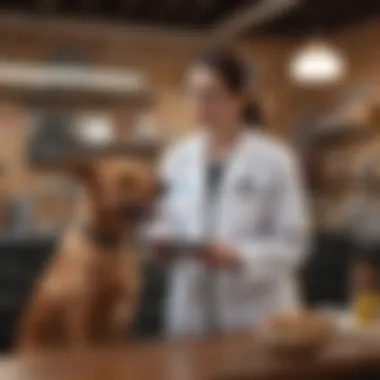Nutritional Guidance for Dogs Experiencing Diarrhea


Intro
Managing your dog's health demands attention to nutrition, especially when facing conditions such as diarrhea. Understanding the relationship between diet and gastrointestinal health is vital. This guide will present dietary interventions that can assist in alleviating symptoms, restoring balance, and ensuring overall wellness for your canine companion.
Understanding Your Pet
Being aware of your dog's unique traits is the key to effective management of dietary issues. Each breed comes with specific characteristics that may influence its digestive health.
Breed Traits
Some dog breeds are more predisposed to gastrointestinal issues. For instance, miniature and toy breeds often experience more digestive upsets than larger breeds. Knowledge of these traits is crucial in choosing appropriate foods.
Common Temperaments
Each dog possesses a temperament that can affect its eating habits. For example, anxious dogs may suffer from stress-induced diarrhea. Identifying the underlying stressors can guide dietary decisions and improve the dog's overall health.
Special Needs
Older dogs or those with pre-existing health issues may require tailored nutrition to support their digestive function. Working with a veterinarian to analyze your pet's specific needs can yield better outcomes.
Nutritional Guidance
Diet plays a pivotal role in managing diarrhea. Adjustments may be necessary to provide relief and prevent future issues.
Nutrients and Ingredients to Include
- Easily Digestible Carbohydrates: Foods such as white rice or pumpkin can help firm up stools.
- Lean Proteins: Boiled chicken or turkey can provide essential proteins without overwhelming the digestive system.
- Probiotics: Incorporating probiotics can help restore the natural balance of gut bacteria.
Foods to Avoid
- Dairy products can exacerbate diarrhea in some dogs.
- Fatty foods are also detrimental and should be strictly avoided.
- Foods containing artificial additives can lead to digestive issues.
Implementing Dietary Changes
Practical changes in feeding practices can assist in managing diarrhea effectively.
- Gradual Transition: When introducing new foods, do so slowly to avoid further upset.
- Smaller Portions: Feeding smaller, more frequent meals can be gentler on a sensitive stomach.
- Hydration: Ensuring adequate water intake is essential. Dogs with diarrhea can quickly become dehydrated.
Monitoring and Follow-Up
Observation plays a crucial role in managing your dog's recovery from diarrhea. Keep an eye on their stool consistency, energy levels, and overall behavior. If symptoms persist, consulting with a veterinarian is advisable.
"A balanced diet not only aids in recovery but also supports overall health, ensuring a longer, happier life for your pet."
Culmination
Nutritional guidance is essential for dogs experiencing diarrhea. Paying attention to their needs, providing the right nutrition, and observing their responses can significantly improve their health. This approach fosters a healthier life for your furry family member.
Understanding Diarrhea in Dogs
Diarrhea in dogs is a common issue that many pet owners encounter. Understanding this condition is crucial for effectively managing a dog's health. Diarrhea can lead to dehydration, weight loss, and an overall decline in well-being if not properly addressed. It is not merely a nuisance but an indicator of underlying health problems that may require attention.


Recognizing the symptoms of diarrhea is essential. Owners must be able to distinguish between mild gastrointestinal upset and more serious issues. Additionally, awareness of the various causes of diarrhea can assist in determining the appropriate response. Some causes may be harmless, stemming from dietary indiscretion, while others may indicate infections or chronic conditions requiring veterinary intervention.
Importantly, knowing when to seek professional help can be a matter of life and health for a dog. Prompt action can lead to timely treatment, preventing complications that may arise from untreated diarrhea.
Overall, an understanding of diarrhea in dogs prepares pet owners by equipping them with the knowledge to make informed decisions, ensuring their pets receive the care they need quickly and efficiently.
The Role of Diet During Diarrhea
Diet plays a crucial role in the management of dogs experiencing diarrhea. When a dog suffers from this condition, it is often a reflection of an underlying issue that can be exacerbated or mitigated by their nutritional intake. Correct dietary choices can alleviate symptoms and support the recovery process, making food one of the most vital components in restoring a dog’s health.
During episodes of diarrhea, it is essential to consider how food impacts recovery. Proper nutrition helps to reduce inflammation, restore gut health, and replace lost nutrients. Additionally, diet can influence the consistency and frequency of stool production. By selecting the right foods, pet owners can provide their dogs with the necessary tools for recovery while ensuring the body receives the essential elements needed for overall wellness.
Impact of Nutrition on Recovery
The type of food provided during a bout of diarrhea can significantly impact a dog's recovery. Nutritional choices should focus on easy-to-digest ingredients that are gentle on the stomach.
Key aspects include:
- Digestibility: Foods that are easy to digest can help minimize intestinal irritation. Options like boiled chicken and plain rice are often favored for their simplicity.
- Nutrient Replacement: Diarrhea can lead to a quick depletion of essential nutrients. Foods that are rich in certain vitamins and minerals can aid in restoring the body’s balance.
- Hydration Support: Some diets can assist in maintaining hydration, which is critical during diarrhea. Incorporating foods with high moisture content, such as plain pumpkin, can contribute to overall fluid intake.
- Probiotic Support: Certain diets may also include probiotics or ingredients known to support gut flora, further promoting recovery. This helps to rebuild the healthy bacteria in the gut that may have suffered during illness.
Goals of Dietary Management
Managing a dog’s diet during diarrhea involves defining clear goals to ensure effective recovery and prevent reoccurrence.
Primary goals include:
- Stabilization of Stomach: The immediate objective is to calm the digestive tract. A bland diet that minimizes agitation in the stomach is vital during this phase.
- Restoration of Gut Health: Once the dog stabilizes, the focus can shift to reintroducing a balanced diet that supports gut health. This involves carefully selecting foods that promote digestion and nutrient absorption.
- Identification of Triggers: Long-term management should also include identifying any potential trigger foods that might cause future diarrhea episodes. This may require trial and error with various food types or consultation with a veterinarian.
- Support Overall Health: Finally, the ultimate goal is to provide a diet that fosters overall health, with an emphasis on balanced nutrition that supports a dog’s unique needs, taking into account their age, size, and specific health concerns.
"A well-managed diet can be the cornerstone of returning a dog to optimal health post-diarrhea, establishing a foundation for future dietary practices."
By focusing on these goals and consistently monitoring the dog's response to dietary changes, pet owners can navigate the often-complex process of managing diarrhea. This proactive approach not only addresses the immediate symptoms but also enhances long-term health outcomes.
Recommended Food for Dogs with Diarrhea
Selecting appropriate food for dogs experiencing diarrhea is vital. The right nutrition not only supports recovery but also helps to stabilize your dog's digestive system. When a dog has diarrhea, their digestive tract is inflamed, and certain foods can worsen this condition, while others may promote healing. This section will discuss various food options that can be beneficial during this time and explain why they are recommended.
Bland Diet Options
Boiled Chicken and Rice
Boiled chicken and rice is a commonly recommended choice for dogs with diarrhea. This diet is easy to digest. Chicken provides protein, which is essential for recovery, while rice offers a source of carbohydrates that can help firm up stool. The simplicity of this combination minimizes the potential for gastrointestinal irritation. However, it must be prepared without any seasoning or oils to maintain its effectiveness. While it is a widely accepted option, relying on it for extended periods might lead to nutritional deficiencies. It’s important to transition back to a balanced diet once the dog begins to recover.
Plain Pumpkin
Plain pumpkin is known for its beneficial effects on canines with diarrhea. It is high in fiber, which can help absorb excess water in the digestive tract. The fiber content can aid in bulking up the stool, making it a practical choice for recovery. When considering pumpkin as a food choice, ensure it is plain and without additives like sugar or spices. The unique feature of pumpkin is its natural source of nutrients and easy digestibility. However, too much pumpkin can lead to constipation, so moderation is key in its usage.
White Rice and Fish
White rice combined with fish is another gentle diet option. Fish provides high-quality protein and omega-3 fatty acids, which can support overall health. The pairing with white rice helps ensure it remains easy on the stomach. This dish can be appealing to dogs, especially if they are disinterested in food due to their condition. One advantage of this meal is its palatability, which can encourage eating. Still, it is essential to choose fish that is free from bones and prepared without oils or seasonings.
Commercial Diets for Canine Diarrhea


Prescription Diets
Prescription diets are formulated specifically for dogs with digestive issues. They often contain easily digestible ingredients and are balanced to support recovery. These diets may include proteins that are novel or hydrolyzed, making them less likely to cause allergic reactions. A significant benefit is that they are scientifically designed to meet a dog's unique dietary needs during gastrointestinal distress. However, these diets typically require a veterinarian's guidance, and they can be more expensive than regular dog food.
Over-the-Counter Options
Over-the-counter options provide another alternative for managing canine diarrhea. Some brands offer specially formulated recipes designed for digestive health. These foods often feature high-quality ingredients while being free from artificial additives. The accessibility of these diets makes them a convenient choice. However, not all over-the-counter options are created equal, and careful selection is necessary to ensure they meet your dog's dietary requirements.
Natural Food Choices
Sweet Potatoes
Sweet potatoes are an excellent natural food choice for dogs experiencing diarrhea. They are high in fiber and provide a rich source of vitamins. This food option can help soothe the digestive tract and promote bowel regularity. Additionally, they have a pleasant taste that many dogs enjoy. While sweet potatoes are generally safe, they should be cooked thoroughly and served without added ingredients to maximize their benefits during recovery.
Oatmeal
Oatmeal serves as another beneficial ingredient for managing diarrhea. It is gentle on the stomach and can provide soluble fiber, which is advantageous in absorbing excess water. This food option is particularly useful for dogs that may have sensitivities to more common foods. When including oatmeal in your dog’s diet, it should be prepared plain and cooked without any additives. While it is a healthy alternative, it should not be the sole component of their diet for an extended duration.
Complementary Strategies to Diet
Complementary strategies to diet are crucial when managing dogs suffering from diarrhea. While selecting the right food plays a significant role in recovery, other elements should not be overlooked. Factors like hydration and the introduction of probiotics can greatly influence your dog’s recovery process. Understanding these complementary strategies can help ensure that dogs not only regain their regular diet but also maintain good health in the long term.
Hydration Considerations
Dehydration often accompanies diarrhea in dogs. It is a serious condition that can develop rapidly due to fluid loss. Ensuring adequate hydration is essential.
- Symptoms of Dehydration: Monitor for signs such as dry mouth, lethargy, and skin elasticity. If you notice your dog is drinking less water than usual, intervention is necessary.
- Hydration Solutions: Encourage your dog to drink plenty of clean water. Adding electrolyte solutions specifically designed for pets can also be beneficial. Products like Pedialyte or similar electrolyte fluids can help replenish lost nutrients, but always consult your veterinarian before administering such fluids.
- Wet Food Inclusion: Incorporating wet food can aid hydration as it contains a higher moisture content compared to dry kibble. This might assist pets who are reluctant to drink water.
Including hydration strategies will enhance the effect of dietary changes, promoting recovery from diarrhea.
Probiotics in Recovery
Probiotics can play an important role in restoring gut health following diarrhea. These beneficial bacteria help reestablish a healthy balance in intestinal flora, which can be disrupted during gastrointestinal distress.
- Types of Probiotics: Look for products that contain strains like Lactobacillus or Bifidobacterium, which have been shown to be effective for improving gut health in dogs.
- Administration: Probiotics can be given in the form of supplements or through specific yogurts designed for dogs.
- Timing and Duration: It's best to introduce probiotics during and after the acute phase of diarrhea to ensure your dog’s gut flora returns to normal.
"Probiotics may not only help with immediate recovery, but they can also provide benefits for long-term digestive health."
Incorporating these complementary strategies will address the broader aspects of care for your dog. Holistic approaches ensure a quicker recovery and support overall well-being, benefiting your furry friend in the long run.
Implementing Dietary Changes
Implementing dietary changes is a crucial step in managing diarrhea in dogs. A dog's gastrointestinal system can react negatively to sudden shifts in diet, making gradual changes essential. This process ensures that the dog's digestive system adapts to new food types without additional stress.
When dealing with diarrhea, the right food can aid in recovery. Adjusting the diet can address underlying issues, minimize discomfort, and improve overall health. This approach offers several benefits: it helps balance nutrients, restores gut flora, and reduces the likelihood of recurring digestive problems. However, pet owners should consider the individual needs of their dog, as each case can vary significantly.
In addition, dietary changes can improve the nutritional quality of a dog's meals. For instance, switching to easily digestible foods can provide essential nutrients while allowing the gastrointestinal tract to heal. Monitoring the dog's reaction to these changes is equally important. The careful observation of symptoms aids in understanding how well the new diet is working and if additional adjustments are necessary.
Transitioning to New Foods
Transitioning to new foods should be done gradually. Start by mixing the new food with the dog's current diet. A common method is the 75/25 rule, where 75% of the old food is blended with 25% of the new food. Over the course of several days, gradually increase the new food while decreasing the old food. This method minimizes gastrointestinal upset, which can occur if the new diet is introduced too quickly.


During this period, it is important to keep a close eye on the dog's stool consistency and overall behavior. Any changes, such as an increase in diarrhea, can indicate intolerance or an adverse reaction to the new food. To help in this transition, consider choosing bland and easily digestible options like boiled chicken, white rice, or specific commercial diets designed for sensitive stomachs.
Monitoring Your Dog's Response
Monitoring your dog's response to dietary changes is essential for effective management. Keep a close record of your dog's behavior and stool quality. This record provides valuable insights into how well the new food is being tolerated. If diarrhea persists for more than a few days, or if other symptoms arise such as vomiting or lethargy, consult a veterinarian.
Here are some key signs to watch for:
- Improvement in stool consistency
- Increased energy levels
- Reduced vomiting
- Preference for the new food
If your dog shows improvement, it is a good sign that the new diet is suitable. However, should any concerning symptoms emerge, it is vital to seek veterinary advice. Maintaining open communication with a vet can ensure that your dog receives the best possible care.
Remember: Gradual dietary changes paired with thorough monitoring are key to a smooth recovery.
Long-term Nutritional Management for Sensitivity
Effective long-term management of nutritional needs is critical for dogs that show ongoing sensitivity, particularly after experiencing diarrhea. This approach involves careful evaluation of food choices and considering how modifications can enhance the dog’s overall health. Connecting food sensitivities to diet through monitoring and adjustments aids in preventing recurrences of gastrointestinal distress.
Pet owners should understand that prolonged dietary sensitivity can lead to recurring issues if not managed correctly. Identifying suitable foods helps maintain a balance. Therefore, knowing how certain ingredients affect a dog's digestive health is crucial for recovery and long-term well-being.
Here are key elements to consider:
- Consistency in Diet: A stable diet helps in minimizing gastrointestinal upset. Gradual changes will yield better acceptance and less distress.
- Individual Needs: Each dog is different; personalized dietary plans accommodate specific needs and sensitivities.
- Monitor Symptoms: Keeping an eye out for signs of discomfort or changes in stool can inform necessary adjustments.
- Long-term Health Risks: Chronic diarrhea can lead to nutrient deficiencies. Hence, focusing on balanced nutrition is essential.
In summary, successful long-term management revolves around knowing your dog’s unique dietary needs and adapting accordingly. This reduces the risk of future complications related to diarrhea and ensures a better quality of life.
Identifying Trigger Foods
Understanding what causes gastrointestinal issues in dogs is a foundation of effective dietary management. Every dog can react differently to various foods, which may include common ingredients such as grains, dairy, or certain proteins. Pinpointing these trigger foods requires a meticulous approach.
- Elimination Diet: Start with a basic diet excluding common allergens. Observe for changes in health or stool quality. Gradually reintroduce one food item at a time to identify triggers.
- Record Keeping: Documenting the dog's food intake and any associated reactions aids in correlating specific foods with adverse effects. Utilizing a food journal can simplify this tracking process.
- Consultation with Veterinarians: Discuss findings with a veterinarian who can provide professional guidance on dietary management. This can further clarify which specific ingredients to avoid.
- Lifelong Adjustments: As dogs age or their health changes, revisit their dietary routine. Some foods may become problematic over time, necessitating further changes.
Nutritional Supplements Considerations
In addition to food choices, nutritional supplements can play a role in long-term management for dogs with sensitivities. These supplements might help in restoring gut health and enhancing recovery.
- Probiotics: These beneficial bacteria can help improve gut flora. They are effective in balancing the digestive system and may reduce the risk of future diarrhea episodes.
- Digestive Enzymes: Adding digestive enzymes can assist in breaking down food more effectively. This may ease digestive burdens and enhance nutrient absorption, especially for sensitive dogs.
- Omega Fatty Acids: Supplements rich in omega-3 and omega-6 fatty acids may help reduce inflammation in the digestive tract. This can be beneficial for overall gut health.
- Vitamins and Minerals: Ensuring that the dog's diet is fortified with necessary vitamins and minerals can prevent deficiencies that can occur after episodes of diarrhea.
With careful attention on identifying trigger foods and incorporating appropriate supplements, pet owners can enhance the well-being of their dogs and foster long-term health. In doing so, they contribute to a more stable digestive system and a happier, healthier life for their pets.
Veterinary Resources
Consulting with a veterinarian is one of the most important steps for any pet owner dealing with a dog suffering from diarrhea. Veterinarians can offer expert insights into the underlying causes of diarrhea and recommend appropriate dietary changes. They can assess the dog’s overall health and determine if further tests are necessary.
Additionally, veterinarians might provide either prescription diets specifically designed to manage gastrointestinal upset or guidance on over-the-counter products that are safe and effective. Regular check-ups can also ensure that no long-term issues develop as your dog is treated for digestive distress.
Benefits of utilizing professional veterinary resources include:
- Accurate diagnosis of underlying conditions
- Customized dietary recommendations
- Monitoring of recovery progress
- Prevention of potential complications
Online Communities and Forums
Joining online communities and forums can enhance the support system for dog owners. Platforms like Reddit or Facebook have numerous groups where pet owners share experiences, tips, and advice. Engaging with likeminded individuals allows you to gain insights that are practical and sometimes overlooked in formal resources. These platforms can offer a sense of camaraderie, understanding, and shared responsibility.
When tapping into these online spaces, here’s what you can find:
- First-hand accounts of dietary changes by others in similar situations
- Suggestions for products or diets that have been effective
- Emotional support from others who are also caring for pets with health challenges



